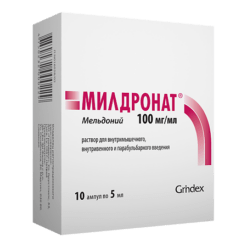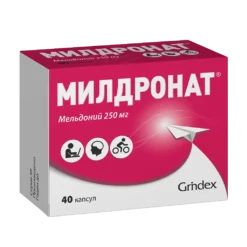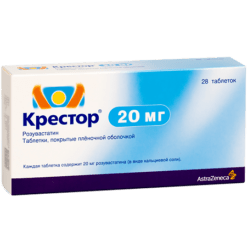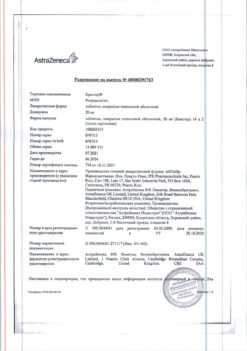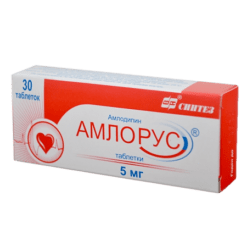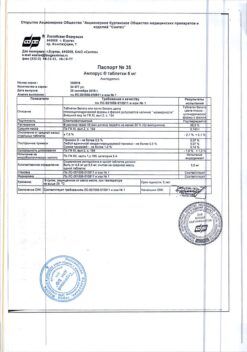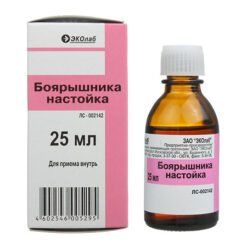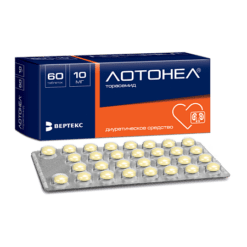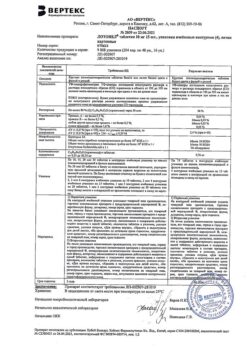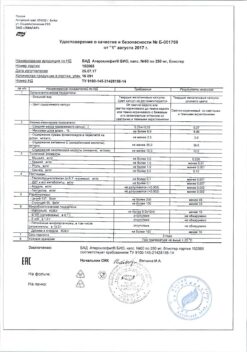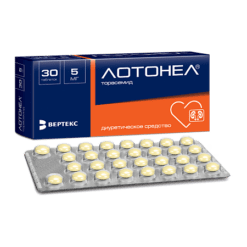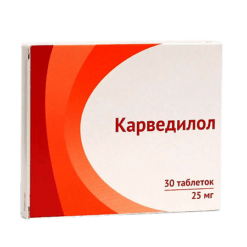No products in the cart.
Mildronate, 500 mg capsules 60 pcs
€40.90 €38.95
Description
Meldonium is a synthetic analogue of gamma-butyrobetaine, a substance found in every cell of the human body. It inhibits gamma-butyrobetaine hydroxinase, reduces the synthesis of carnitine and transport of long-chain fatty acids through cell membranes, prevents the accumulation of activated forms of non-oxidized fatty acids in cells – derivatives of acylcarnitine and acylcoenzyme A.
Cardioprotective agent that normalizes myocardial metabolism. Under the conditions of ischemia Meldonium restores equilibrium between the processes of oxygen delivery and its consumption in cells, prevents violation of adenosine triphosphate (ATP) transport; simultaneously it activates glycolysis which proceeds without additional oxygen consumption. As a result of a decrease in the concentration of carnitine, gamma-butyrobetaine, which has vasodilatory properties, is synthesized intensively. The mechanism of action determines the diversity of its pharmacological effects: increase of work capacity, reduction of symptoms of mental and physical overexertion, activation of tissue and humoral immunity, cardioprotective effect.
In case of acute ischemic myocardial injury, meldonium slows down the formation of the necrotic zone and shortens the rehabilitation period.
In cases of heart failure, it increases myocardial contractility, increases exercise tolerance, and decreases the frequency of angina attacks. In acute and chronic ischemic disorders of cerebral circulation, it improves blood circulation in the focus of ischemia and promotes redistribution of blood in favor of the ischemic area.
It is effective in cases of vascular and dystrophic pathology of the fundus vessels.
The tonic effect on the central nervous system, elimination of functional disorders of the somatic and vegetative nervous system in patients with chronic alcoholism with withdrawal syndrome is also characteristic.
Pharmacological action
Pharmacological action
Cardioprotective agent which normalizes myocardial metabolism and has vasodilator properties.
Pharmacokinetics
Meldonium is rapidly absorbed after oral administration with a bioavailability of 78%. Time of reaching maximum concentration in blood plasma – 1 to 2 hours after ingestion. It is metabolized mainly in the liver to form two major metabolites, which are eliminated by the kidneys. Period of half-life (T1/2) when taken orally depends on the dose, is 3 – 6 hours.
Indications
Indications
In the complex therapy of coronary heart disease (angina pectoris, myocardial infarction), chronic heart failure and dyshormonal cardiomyopathy, as well as in the complex therapy of subacute and chronic disorders of the blood supply to the brain (after a stroke, cerebrovascular insufficiency).
Reduced performance; mental and physical overload (including among athletes).
Withdrawal syndrome in chronic alcoholism (in combination with specific therapy).
Pharmacological effect
Pharmacological effect
Meldonium is a synthetic analogue of gamma-butyrobetaine, a substance that is found in every cell of the human body. Inhibits gamma butyrobetaine hydrooxinase, reduces the synthesis of carnitine and the transport of long-chain fatty acids through cell membranes, and prevents the accumulation in cells of activated forms of unoxidized fatty acids – derivatives of acylcarnitine and acyl coenzyme A.
Cardioprotective agent that normalizes myocardial metabolism. Under conditions of ischemia, meldonium restores the balance between the processes of oxygen delivery and its consumption in cells, prevents disruption of adenosine triphosphate (ATP) transport; At the same time, it activates glycolysis, which occurs without additional oxygen consumption. As a result of a decrease in carnitine concentration, gamma-butyrobetaine, which has vasodilating properties, is intensively synthesized. The mechanism of action determines the variety of its pharmacological effects: increased performance, reduced symptoms of mental and physical stress, activation of tissue and humoral immunity, cardioprotective effect.
In the case of acute ischemic damage to the myocardium, meldonium slows down the formation of the necrotic zone and shortens the rehabilitation period.
In heart failure, it increases myocardial contractility, increases exercise tolerance, and reduces the frequency of angina attacks. In acute and chronic ischemic disorders of cerebral circulation, it improves blood circulation in the ischemic area and promotes the redistribution of blood in favor of the ischemic area.
Effective in cases of vascular and dystrophic pathology of the fundus vessels.
It is also characterized by a tonic effect on the central nervous system, elimination of functional disorders of the somatic and autonomic nervous systems in patients with chronic alcoholism with abstinence syndrome.
PHARMACOLOGICAL ACTION
A cardioprotective agent that normalizes myocardial metabolism and has vasodilating properties.
PHARMACOKINETICS
After oral administration, meldonium is rapidly absorbed, bioavailability is 78%. The time to reach maximum concentration in blood plasma is 1 – 2 hours after oral administration. Metabolized mainly in the liver with the formation of two main metabolites, which are excreted by the kidneys. The half-life (T1/2) when taken orally depends on the dose and is 3 to 6 hours.
Special instructions
Special instructions
Patients with chronic liver and kidney diseases should be careful with long-term use of the drug.
Use in pediatrics
There is insufficient data on the use of Mildronate in children and adolescents under 18 years of age.
Impact on the ability to drive vehicles and operate machinery
There is no data on the adverse effects of the drug Mildronate on the ability to drive vehicles and operate machinery.
Active ingredient
Active ingredient
Meldonium
Composition
Composition
1 caps. meldonium dihydrate 500 mg
Excipients:
potato starch – 27.2 mg,
colloidal silicon dioxide – 10.8 mg,
calcium stearate – 5.4 mg.
Composition of the capsule shell:
titanium dioxide (E171) – 2%,
gelatin – 98%.
Pregnancy
Pregnancy
The safety of the drug during pregnancy has not been established. To avoid possible adverse effects on the fetus, Mildronate should not be prescribed during pregnancy.
It is not known whether meldonium dihydrate is excreted in breast milk. If it is necessary to use the drug Mildronate during lactation, breastfeeding should be discontinued.
Contraindications
Contraindications
Hypersensitivity to the active substance and other components of the drug, increased intracranial pressure (due to impaired venous outflow, intracranial tumors), age under 18 years (efficacy and safety have not been established), pregnancy, breastfeeding.
Side Effects
Side Effects
Rarely – allergic reactions (redness and itching of the skin, skin rash, urticaria, angioedema), as well as dyspeptic symptoms, tachycardia, decreased or increased blood pressure, increased excitability.
Very rarely – eosinophilia, general weakness.
Interaction
Interaction
Mildronate enhances the effect of coronary dilatants, some antihypertensive drugs, and cardiac glycosides.
Mildronate can be combined with prolonged forms of nitrates, other antianginal drugs, anticoagulants and antiplatelet agents, antiarrhythmic drugs, diuretics and bronchodilators.
Due to the possible development of tachycardia and arterial hypotension, caution should be exercised when combined with nitroglycerin (for sublingual use) and antihypertensive drugs (especially alpha-blockers and short-acting forms of nifedipine).
Overdose
Overdose
Symptoms: decreased blood pressure, accompanied by headache, tachycardia, dizziness and general weakness.
Treatment: symptomatic therapy.
Storage conditions
Storage conditions
In a dry place, at a temperature not exceeding 25 °C
Shelf life
Shelf life
4 years.
Manufacturer
Manufacturer
Grindeks JSC, Latvia
Additional information
| Shelf life | 4 years. |
|---|---|
| Conditions of storage | In a dry place, at a temperature not exceeding 25 °C |
| Manufacturer | Grindex JSC, Latvia |
| Medication form | capsules |
| Brand | Grindex JSC |
Other forms…
Related products
Buy Mildronate, 500 mg capsules 60 pcs with delivery to USA, UK, Europe and over 120 other countries.


